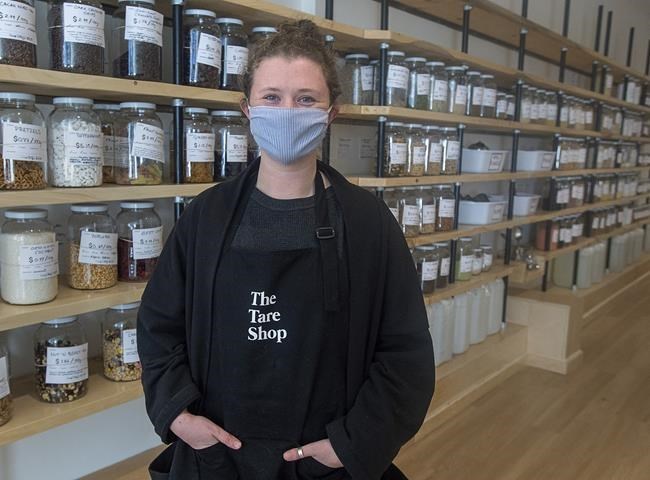HALIFAX — Customers at The Tare Shop in Halifax are creative with their containers: Some use classic jars but others reuse yogurt containers, pots and pans or even empty glass liquor bottles.
“One of our regulars who lives across the street came in with a salad bowl,” says Kate Pepler, the shop’s owner. “As long as it’s clean and empty, anything goes.”
The Tare Shop is part of a new wave of package-free stores aiming to minimize the environmental impact of shopping for groceries and everyday goods. Rather than simply reducing packaging waste or ensuring it's recyclable, the goal is to eliminate it altogether.
Everything from food and body care products to home cleaning and stationery goods is available in bulk to be purchased with a reusable container.
The package-free retail trend fits into a broader zero-waste lifestyle movement seeking to encourage more sustainable and mindful shopping habits, and it shows no signs of abating due to the pandemic.
Stores such as Pepler's are building on norms from natural food stores that have long allowed customers to use their own containers for products like dried beans and grains.
In 2016, national retailer Bulk Barn began allowing customers to bring their own containers, though they have paused the practice during the pandemic.
But the new wave of package-free stores isn’t just an expansion of the “hippie and granola” market of the boomer generation or a new take on a discount bulk retailer, says consumer behaviour expert Nicole Mead.
“They're offering a lifestyle and an image,” says Mead, associate marketing professor in the Schulich School of Business at York University. “Consumers want an experience with a certain boutique esthetic and a carefully curated selection of products.”
Millennial and gen-Z consumers want sustainable products but in a “chic, high-status, Instagrammable sort of way,” she says.
“It's not just about environmentalism or sustainability or reducing waste,” she says. “That’s a huge part of it, but consumers also want their consumption to have a sense of purpose, to feel authentic and maybe even virtuous.”
Dayna Stein, the founder of Bare Market in Toronto, says she focused a lot on the esthetic appeal of the package-free goods shop before opening the store last year.
“We felt that if the space was inviting and a place that people would want to spend time in and take photos of, it would help incentivize that behaviour change that we're trying to see.”
The shop, which sells everything from bulk hairspray and makeup to bulk essential oils and ketchup, set out to expand the availability of bulk items beyond dried food, Stein says.
While the store encourages people to bring their own containers, it also operates a deposit program on glass jars for online orders or if someone doesn’t have their own container in-store.
Most package-free stores are considered essential and have remained open during COVID-19.
Stein says Bare Market moved entirely to a deposit program at the outset of the pandemic when sales moved online, but since September, customers have been able to bring their own containers into the store again.
Indeed, most independent shops are allowing customers to bring their own containers as long as they're clean. They're also requiring customers use a different clean scoop or funnel for every product to avoid cross-contamination, something most did before COVID-19 as well.
While the package-free retail trend appears to be growing, some question the practicality of it for certain consumers.
“In terms of sustainability, it’s a perfect way to reduce packaging,” says Saibal Ray, a professor in the Bensadoun School of Retail Management at McGill University. “The problem is the implementation of it is difficult.”
Some shoppers have trouble remembering to bring reusable bags to the grocery store, let alone dozens of clean empty containers, he says.
“There’s clearly a market for package-free stores, but it may not be that practical for a larger family."
Even so, Pepler's customers have embraced the concept.
While The Tare Shop started with 40 bulk “household standards,” Pepler says she has since expanded her inventory to more than 200 items based on customer requests.
“We now sell package-free tofu and also corn tortillas that are both made locally,” she says. “The nice thing is you can just buy the exact amount you need, so there’s also less food waste.”
A second location of The Tare Shop opened in Dartmouth earlier this month.
“Demand has been really positive even throughout COVID,” Pepler says. “I’m honestly blown away by how many people are interested in living a lower-waste lifestyle.”
This report by The Canadian Press was first published Jan. 29, 2021.
Brett Bundale, The Canadian Press



